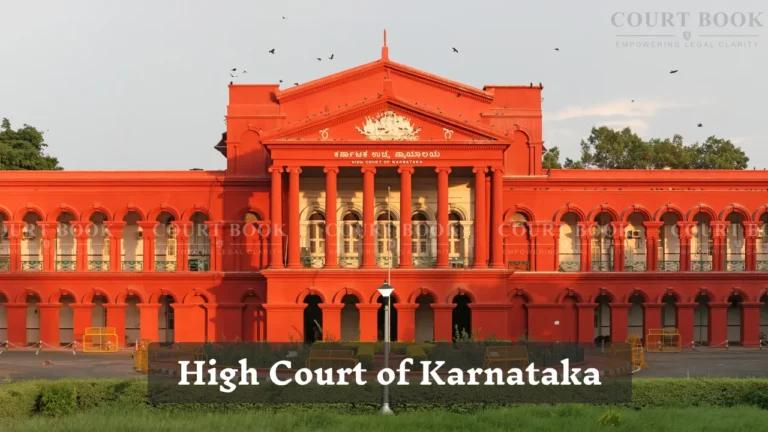The Karnataka High Court has ruled that a marriage not registered under the Foreign Marriage Act, 1969, cannot be declared void merely due to procedural non-compliance. The court emphasized that such marriages can still be considered valid under Indian law, particularly if substantiated with supporting documents and if they align with the personal law governing the parties.
The Foreign Marriage Act must be interpreted in a purposive and inclusive manner, ensuring that genuine relationships are not denied legal protection simply due to technical irregularities, said Justice Ramachandra D. Huddar.
Read Also:-Petition Challenges Kannada Mandate in Non-State Schools, Karnataka HC Gives State 3 Weeks
The court was hearing a batch of appeals filed by Mohamed Umar Seeni Ariff Khan and others, who challenged a trial court's interim order passed on October 16, 2024. The trial court had granted a temporary injunction in favour of the plaintiff, Mrs. Tanzia Bano alias Tanzia Banu, restraining the appellants from alienating or encumbering the B-schedule property, which is the subject matter of the suit. The trial court also dismissed the defendants’ applications seeking to vacate the said injunction.
Mrs. Tanzia Bano, widow of the late Imran Khan M.S., had filed a suit seeking declaration, partition, and injunction against the appellants, who are her deceased husband’s parents. She claimed to be the legally wedded wife of Imran Khan and alleged that during their marriage, she transferred substantial sums in both Indian and US currencies to her husband’s account. She contended that these funds were used by her father-in-law to purchase the suit property, which was agreed to be registered in his name only for convenience since she and her husband resided abroad at the time.
The appellants, however, disputed the marital status of the plaintiff with their deceased son and denied her claim over the property. They contended that the property was purchased solely with the funds of the first defendant and that the plaintiff was merely allowed temporary residence in the property during her husband’s illness. They also challenged the validity of the marriage certificate produced by the plaintiff, arguing that it was notarised in the United States and not registered under the Foreign Marriage Act, 1969.
Whether or not the marriage meets the technical requirements under the Foreign Marriage Act is a matter for final adjudication and not relevant for granting interim relief, the bench observed.
Justice Huddar noted that the plaintiff had produced a notarised marriage certificate from the United States, joint bank account records, photographs, WhatsApp messages, and various utility bills as evidence of her marital relationship and contribution towards the property.
"Even if a marriage is not registered under the Foreign Marriage Act, 1969, it can still be treated as valid under Indian law for interim purposes, especially when supported by documentation such as photos, joint accounts, and proof of cohabitation," the court remarked.
The court added that the Act provides a formal legal framework for solemnising marriages abroad but does not invalidate marriages conducted in accordance with the customs or religious practices of a foreign country. Such marriages may still carry legal significance under Indian law, unless they violate public policy or legal conditions in India.
The appellants' own affidavits admitted that the plaintiff had lived with their deceased son in the suit property. The court held that this, along with the evidence presented, strongly indicated her possession and continued dominion over the property. The court also rejected the appellants’ argument about suppression of earlier proceedings, noting that the previous suit was disclosed in the current pleadings and was withdrawn in favour of the more comprehensive relief sought in the present suit.
“The trial court’s reasoning is sound, and the balance of convenience favours the plaintiff. Dispossessing her during the pendency of the case would cause irreparable harm which cannot be compensated by damages,” the court stated while affirming the lower court’s decision.
Read Also:-Karnataka High Court Hears X Corp’s Plea Against Arbitrary Content Blocking Under IT Act
The High Court concluded that the trial court had exercised its discretion appropriately under Order 39 Rules 1 and 2 of the Civil Procedure Code and found no grounds to interfere.
Accordingly, all four appeals—MFA Nos. 332/2025, 366/2025, 458/2025, and 489/2025—were dismissed, and the interim injunction granted in favour of the plaintiff was ordered to continue until final adjudication of the suit.
Appearance: Advocate Varadaraj Ranganatha Rao Havaldar represented the appellants, while Advocate Siji Malayil appeared for the respondent.
Case Title: Mohamed Umar Seeni Ariff Khan & ANR vs. Mrs. Tanzia Bano
Case Numbers: MFA No. 366/2025 C/W MFA Nos. 332/2025, 458/2025, 489/2025
Date of Judgment: 7 July 2025
Court: High Court of Karnataka
Judge: Hon'ble Justice Ramachandra D. Huddar














